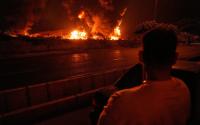by Jeffrey Allen
www.commondreams.org/headline/2009/09/02-6
September 2, 2009
WASHINGTON - Changing weather patterns have decimated crops in several of the world's poorest countries this year, leaving millions in need of food aid and humanitarian workers warning about the dangerous effects of climate change.
What's the Story?
Farmers in Nepal have been able to produce only half their usual crop, said an Oxfam International report released last week. Livestock are dying of malnutrition in Yemen, according to the humanitarian news service IRIN. And the Red Cross is bracing for the effects of heavy rains across 16 West and Central African nations.
All three are the result of extended atypical weather events -- drought, rain, or untimely combinations of both -- in places where subsistence farmers have long depended on predictability.
In Nepal, more than 3 million people -- about 10 percent of the population -- will need food aid this year, said Oxfam. While farmers used to grow enough food for their families to eat for three to six months of the year, last year's crop only amounted to about one month's worth of food for many families, said Oxfam.
The lack of food production has hit Nepali families with a double whammy, not only reducing the amount available to eat, but also diminishing their ability to buy surpluses at market, as costs have increased and incomes decreased.
A combination of natural disasters, including one of the worst winter droughts in the country's history, have levied the current burden on the Himalayan Asian nation, where more than three in ten people live below the poverty line even in good times.
While Oxfam notes that a single drought event can never be attributed to global climate change, the group blames Nepal's food shortage on the unpredictability of weather that scientists say is a direct result of the buildup of greenhouse gases in the atmosphere -- or "climate change."
In recent years, Nepal has experienced greater extremes of temperature, more intense periods of rainfall, drier winters, and delays in the summer monsoon rains. [Read more from Oxfam about climate change and food concerns in Nepal.]
Ice Melt Could Impact Food Supplies, Create Refugees
The mighty glaciers of the Himalayan mountain range are also rapidly changing and could even be at risk of disappearing by mid-century if global emissions of carbon dioxide and other pollutants are not reduced, according to the world's most renowned climate scientists. The people of Nepal and its Asian neighbors downstream are extremely dependent on the rivers running off those glaciers to irrigate croplands and provide drinking water.
"The world has never faced such a predictably massive threat to food production as that posed by the melting mountain glaciers of Asia," says Lester Brown, one of the most respected researchers on how environmental factors impact humans worldwide.
China and India are the world's leading producers of wheat and rice -- humanity's food staples. Significant decreases in their ability to produce those crops will send hunger shockwaves around the world, notes Brown, who is president of the Washington, DC-based Earth Policy Institute.
"The glaciologists have given us a clear sense of how fast glaciers are shrinking. The challenge now is to translate their findings into national energy policies designed to save the glaciers," he says. "At issue is not just the future of mountain glaciers, but the future of world grain harvests." [Read more from the Earth Policy Institute about the threat to food supplies.]
In addition to exacerbating food shortages, ice melt in Antarctica and Greenland could force hundreds of millions of people worldwide to seek refuge on higher ground. At the Earth's poles, snow is melting, sea ice is breaking up, and temperatures are rising -- all at faster rates than elsewhere on the planet -- raising the likelihood of severe sea level rise.
Some refugees would remain within their own countries, while many others would flee to foreign countries, but both groups would impose heightened burdens on the local communities and national governments forced to support them as they build new lives from scratch. [Read more from the Earth Policy Institute about the potential refugee explosion.]
Least to Blame to Suffer Most
Oxfam, whose aid workers are active in scores of countries worldwide, notes that poorer communities tend to be the least able to cope with weather-related disasters and the other effects of climate change.
Ironically -- and many say unfairly -- they are also, by and large, the least responsible for causing climate change.
Nepal, for example, is one of the world's poorest countries and extremely vulnerable to climate change, yet it emits only 0.025 percent of the world's greenhouse gases. The United States, by comparison, is responsible for about 20 percent of the world's greenhouse gas emissions, though Americans only make up about 5 percent of the world's population.
Like many of the humanitarian groups working around the world, Oxfam sees December's global climate summit in Copenhagen as a tremendous opportunity to reverse course and provide a measure of succor to the world's poor, who are already face to face with the disastrous effects of climate change.
"Oxfam is calling on the world's richest countries, those most responsible for global emissions, to do more to help poor countries like Nepal better adapt and mitigate the effects of climate change when they meet to discuss a global climate treaty in Copenhagen in December," the group said last week in a statement.
All eyes will be on the U.S. delegation at those talks, which will be doing the bidding of the new administration of Barack Obama. In previous years, U.S. officials working for the George W. Bush administration have been accused of stalling any meaningful reform initiatives, in efforts to promote the interests of relatively wealthy Westerners over the billions of global poor who will bear the brunt of the changing climate.
Living in 'The Age of Stupid'?
A new movie is launching in the United States Sep. 21 -- about six weeks before the Copenhagen negotiations -- with the aim of raising pressure on the Obama administration and its allies worldwide. The filmmakers want world leaders to take an aggressive approach to stemming greenhouse gas emissions and help poorer countries deal with the inevitable impacts of climate change.
"The Age of Stupid" follows the lives of six people -- an Indian businessman, a Nigerian medical student/fisherwoman, a Shell employee in the United States, an Iraqi refugee family, a British windfarm developer, and an 81-year-old French mountain guide -- who are living with or trying to mitigate the effects of climate change.
The movie launched earlier this year to serious praise in the UK, Australia, and several other countries.
The UK's Guardian newspaper called it "the first successful dramatization of climate change to reach the big screen," and the American actor Ed Begley, Jr. said: "'The Age Of Stupid' is the most powerful, well-researched, and emotional film that I have seen in recent memory."
The former president of the global environmental organization Friends of the Earth, Tony Juniper, hopes the film will spur political action. "This wonderful film is like a bucket of cold water," he said. "I hope it wakes people from their slumber and helps galvanize real pressure on politicians to come up with an effective deal at the Copenhagen climate change summit."
Judging by the response of the UK secretary of state for energy and climate change, Ed Miliband -- who will be at the summit representing the United States' closest ally -- it just might.
Said Miliband: "I thought 'The Age of Stupid' was an incredibly powerful account of the effects of climate change, the urgency of climate change, and the reasons we must act as quickly as possible."
But Obama administration officials have not yet indicated what tack they will take in Copenhagen -- or if they've seen the movie.






